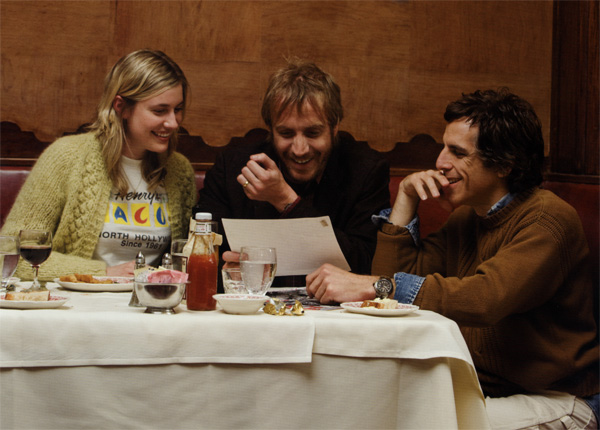Mon 5 Apr 2010
Hollywood and Whine
Posted by Ethan under Film Review, NYC Film Critic
Comments Off on Hollywood and Whine
Greenberg
Directed by Noah Baumbach
Starring Ben Stiller, Greta Gerwig, Rhys Ifans
***1/2
After the disappointing critical and commercial response to Margot at the Wedding (a movie that I actually liked quite a bit), it would have been completely understandable had Noah Baumbach chosen to bounce back by accepting a work-for-hire gig on an upbeat tweenybopper romance or a madcap buddy picture…you know, something lighthearted and fun starring characters that viewers actually like.
But Baumbach being Baumbach, he can’t shut off that part of himself that’s so intrigued by people who are, for lack of a better word, assholes. So he and his wife Jennifer Jason Leigh teamed up to pen the story that would become Greenberg, Baumbach’s fifth feature as a writer/director and, funnily enough, the closest he’ll probably ever come to making a mainstream romantic comedy. Like most of the movies that populate that genre, Greenberg is a kooky love story between two seemingly mismatched people who spend 90-odd minutes denying their attraction to each other only to inevitably discover that they’re a great match. The key difference here is that the most moviegoers won’t be rooting for the would-be couple to hook up because one of them is a neurotic basket case, the other lacks a backbone and both seem entirely ill-prepared for a committed relationship. In other words, welcome to a hilarious episode of Love, Noah Baumbach Style!
Here’s what makes Greenberg an interesting movie to debate though: I’m not entirely certain that Baumbach himself believes that these two people belong together. Few filmmakers are as brutally honest about exposing their characters’ flaws as he is, but he does so without passing judgment on them, which often leads to some confusion over his intentions. For example, one of the most controversial elements in Margot at the Wedding was the relationship between the title character (played brilliantly by Nicole Kidman at her iciest) and her teenage son, who is in her thrall despite the fact that she’s an inconsiderate parent at best and an emotionally abusive monster at worst. (Come to think of it, Baumbach’s The Squid and the Whale covered similar territory, but somehow Jeff Daniels’ bad dad seemed more benign than Kidman’s bad mom.) That the kid not only tolerates her behavior but chooses to stay by her side when he has the opportunity to escape frustrated many viewers and led them to wonder why the writer/director seemed to take such pleasure in being cruel to his characters.
Those folks might feel the same way about the resolution of Greenberg, where the unlucky-in-love Florence (Greta Gerwig) makes a relationship choice that seems guaranteed to condemn her to a life of unhappiness and regret for no other reason than her creator wills it so. And yet, if you’ve been paying the slightest bit of attention to the character’s narrative arc, her decision is completely understandable—even if you violently disagree with it. Truth be told, I left the theater displeased with where she ended up, but in retrospect Baumbach and Gerwig do a very good job preparing you for that finale by making it clear all along that Florence is not the kind of heroine we’re used to seeing in quirky love stories—i.e. the eccentric young woman with a quiet confidence and deep reservoir of relationship wisdom (think Zooey Deschanel in just about any movie she’s ever been in). Instead, she’s stuck in a kind of mental and emotional paralysis, uncertain of what she wants out of life, let alone out of a date. Seemingly incapable of making a decision on her own, she prefers to simply go with the flow doing what other people ask or demand of her. Small wonder that she’s currently employed as the personal assistant to a well-off L.A. power couple. Some critics have referred to her as a doormat and while that might be crueler than I’m willing to be, it’s true that Florence is frustratingly reluctant to assert herself in difficult situations. (I do wish that Baumbach had avoided a climactic revelation about her health, because it could potentially allow viewers to chalk her confused state of mind up to hormones.)
If I seem to be focusing my attention on Florence rather than the film’s title character, Roger Greenberg (played by Ben Stiller in his best, most committed star turn since Zoolander), that’s because she is, by design, the more interesting personality. As if to emphasize that point, Baumbach devotes the first 15 minutes of the film to establishing her daily routine before bringing in Greenberg, her boss’s brother who is house-sitting while the family is on vacation in Vietnam. A deeply neurotic middle-aged man still recovering from a recent nervous breakdown, Roger is a classic Baumbach anti-hero. While we’re never given his full life story, the details that do slip out are telling—many years ago, he was in a band that was on the verge of singing a major record deal, which he single-handedly scuttled after disagreeing over the label’s terms. In the ensuing fallout, he left Los Angeles for New York, where he settled into a makeshift career as a carpenter and largely cut himself off from his old crowd. Now back in sunny Cali, Roger tries reconnecting with his former pals, most notably ex-bandmate-turned-IT guy Ivan (Rhys Ifans), none of whom are all that happy to see him again.
Sensing their animosity, Greenberg turns his attention towards the far less judgmental Florence, who initially tolerates his odd behavior because she seems to think its part of her job description. Certainly, most people would go out of their way to avoid someone that invites himself over to your home and then awkwardly tried to provide you with unasked for oral sex. But Florence finds that bizarre encounter strangely charming, which appears to surprise Roger as much as the audience. Soon, the two are hanging out on a semi-regular basis and talking about themselves as if they’re a real couple. But as amenable as Florence is to the idea of dating Roger, he can’t get over his own insecurities to commit to her. He’s the kind of guy who’d rather bemoan his lack of a relationship than take the necessary steps to having one.
These roles probably sound impossible to play on paper, which makes the pitch-perfect performances by Stiller and Gerwig all the more impressive. It would be misleading to claim that they manage to make Roger and Florence likable, because that’s not the case at all. In fact, if they did then the movie wouldn’t work. Instead, they give equal weight to the characters’ scant virtues and numerous flaws, even if it turns the audience against them. Stiller in particular works hard to upend the Woody Allen-lite persona he’s fallen into over the past decade in mainstream hits like Meet the Parents and Night at the Museum. (He attempted a similar stunt in Tropic Thunder by playing a self-absorbed Stallone-style action star, but that performance was ultimately too much of a put-on to be taken seriously.) As Greenberg, he avoids making any overt bids for the viewer’s sympathy and milks the character’s most awkward and unpleasant moments for all their worth. Gerwig, meanwhile, similarly refuses to apologize for Florence’s behavior; instead she takes the character Baumbach wrote and makes her believable, if not necessarily relatable.
I’m probably making Greenberg sound like an endurance test, but that’s not my intention. This is a funny and observant movie that’s actually quite absorbing and entertaining. It just happens to be about two people who you probably wouldn’t want to spend much time with outside of a movie theater.
Greenberg is playing in theaters now.





No Responses to “ Hollywood and Whine ”
Sorry, comments for this entry are closed at this time.